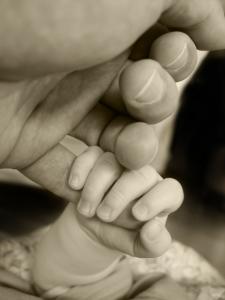I promise to write the final part of my series on Christian Education, but that final is long, involved, and taxing. It’s coming along, though.
Wanted to write a brief observation of what I witnessed this weekend. It’s sad, but it’s also critical for us to expose.
Saturday, my son and I attended an enrichment program for gifted children. The program is wonderful, and my son enjoys it immensely.
We broke for lunch and ate in the mini-cafeteria area. At the tables around ours were groups of dads with their sons and daughters sharing a lunch.
I use that word sharing with trepidation, because not much personal interaction occurred.
At one table, the dad got out lunch, then pulled out his MacBook and proceeded to spend the entire lunch absorbed in the Internet or some other computer-based distraction. His son ate his meal in silence.
At another table, a dad got a cell phone call and spent most of the meal talking to someone distant—rather than the young person immediately before him.
At the table beside ours, the daughter told her dad she loved him. He didn’t respond—too absorbed in his book.
I didn’t have a cell phone with me. I don’t have a laptop computer. My book stayed closed. My son and I talked about life over lunch.
This does not make me Superdad. I’m always Clark Kent. More often than not, I’m clumsy with this or that. I make mistakes with alarming regularity.
But at least I’m present in the moment.
What are we doing to ourselves and to our families? How did we get so distracted?
The dad on the laptop really bugged me, and I felt like saying something to him. But I didn’t. He might have responded, “Yeah, well who made you Superdad?”
That I tolerated the dad on the cell phone a bit more says something about what we’ve come to accept as normal. I hope I never become too normal, though.
And the dad so engrossed in his book? I watched that daughter’s response to the ignoring of her simple affirmation of love. She pulled her coat over her head and retreated into her nylon and polyfill cave. It’s not hard to imagine what might go down in her life as she ages and goes searching for someone, anyone, to say, “I love you, too, darlin’.”
I keep wondering what we’re doing to ourselves. It’s not like any of those dads had no choice. No, they selected their priorities.
How sad that in America 2010, we have so much, yet our much often becomes the building materials for the next generation’s hell.
{Note: I wanted an image for this post that showed a dad ignoring his child while he toyed with some electronic device . Sadly, many stock photos of such a scene exist. I say sadly not because I would have to pay to use that image but because so many pro photographers have seen fit to document such a scene.}

 He entered that vicious vomit cycle of losing so much water from his system that adding it only made him more nauseous. In the end, nothing could stay down. He awoke Friday morning looking like one of those hollow-eyed waifs you see in ads for Third World children’s charities.
He entered that vicious vomit cycle of losing so much water from his system that adding it only made him more nauseous. In the end, nothing could stay down. He awoke Friday morning looking like one of those hollow-eyed waifs you see in ads for Third World children’s charities.